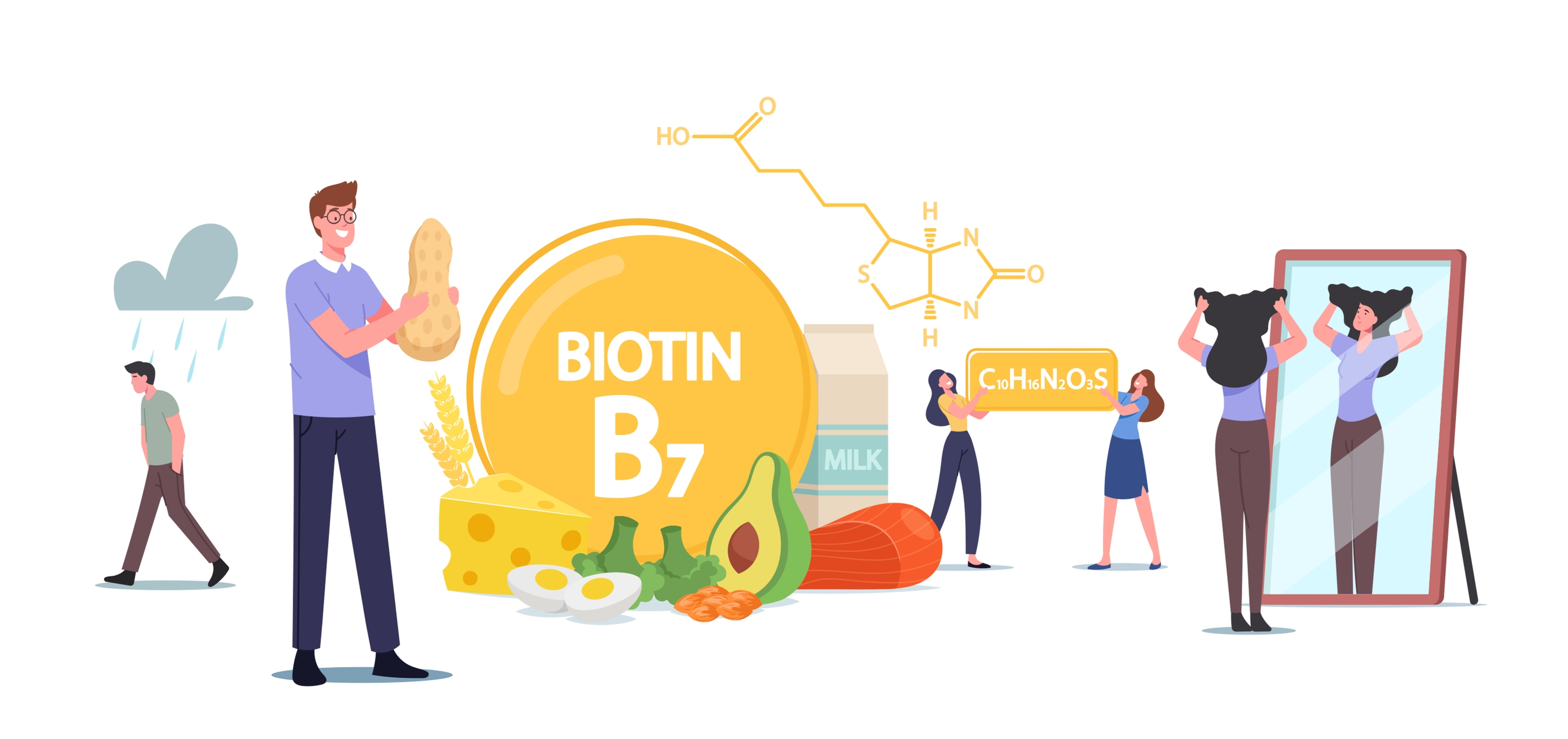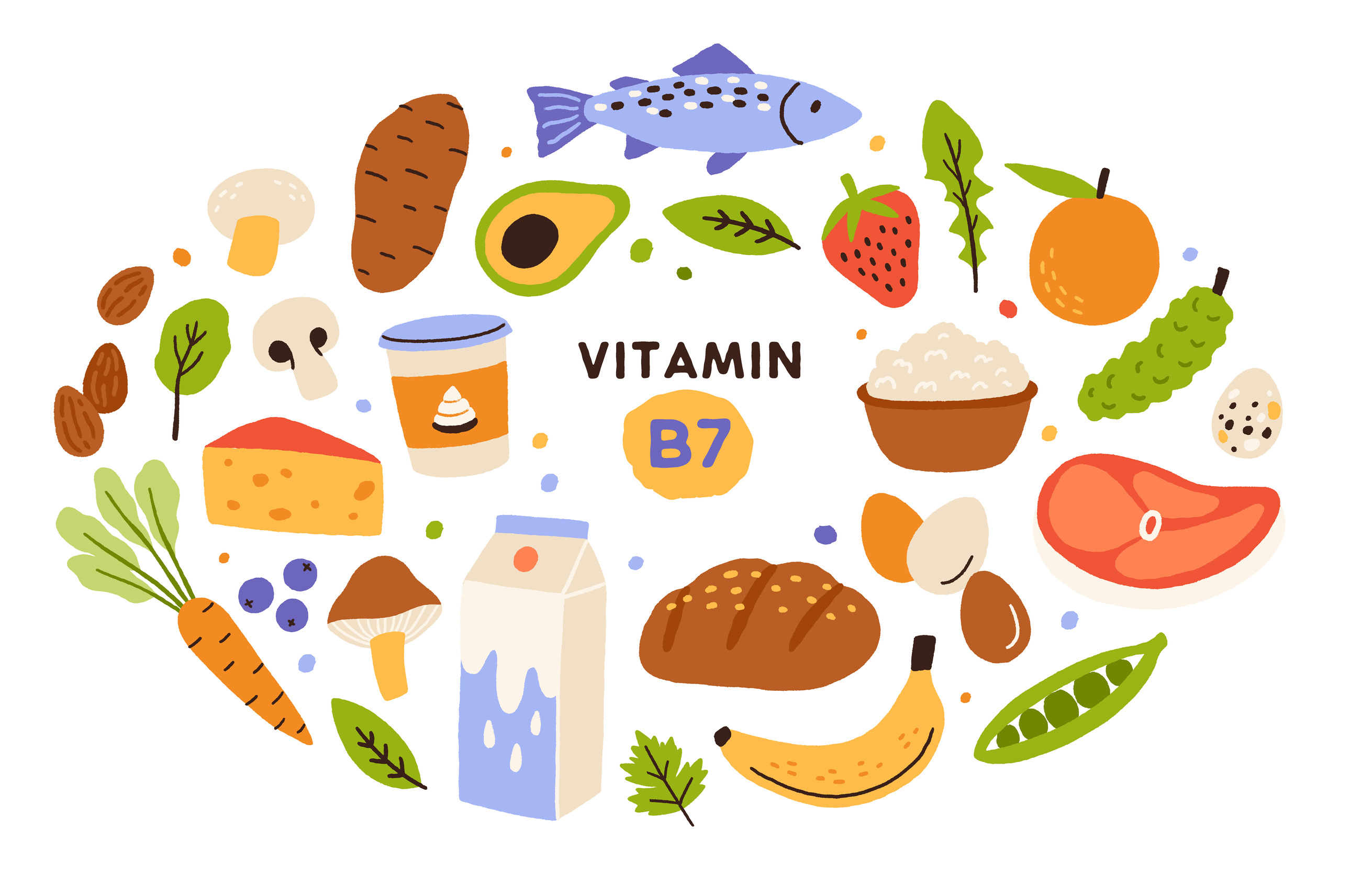
Abstract: Biotin is a water-soluble B vitamin, and like other B vitamins is important for energy metabolism and gene expression. It is a cofactor for various enzymes that work on the metabolism of carbohydrates, fats, and protein. It is found in many common foods, therefore deficiency is rare. Although commonly touted for its benefits for hair and nail growth, evidence is still lacking. During pregnancy, biotin is important for both the health outcomes of the mom and the baby. Deficiency is associated with preeclampsia, low birth weight, and possible fetal malformation.
What is biotin and why do I need it?
Biotin (vitamin B7) is a water-soluble vitamin that is utilized for a variety of metabolic processes.
Since it is water-soluble, your body needs a continuous supply of this vitamin through your diet.
Biotin supplements are often glamorized as a solution for hair loss and to support healthy hair, skin, and nails. Although a deficiency can certainly lead to hair loss, skin, or nail problems, evidence showing the benefits of supplementation is inconclusive.
Other important functions of biotin include:
- Cell proliferation
- Immune function
- Keratin production for hair and nails
- Support of the nervous system
- Functioning of the liver
In this article we will:
- Review biotin’s role in pregnancy
- Introduce the biology of biotin metabolism in the body
- Explore what prenatal vitamins contain biotin
- Learn foods high in biotin
- Define recommended intake, toxicity, and deficiency
Benefits of biotin during pregnancy
Biotin is important for the health of pregnant mothers and the development of a fetus. Some research suggests biotin deficiency is associated with preeclampsia. Preeclampsia is dangerously high blood pressure associated with pregnancy and can result in a host of symptoms including headaches, blurred vision, dizziness, and even the risk of death.
Since biotin plays an important role in keratin production, it is also necessary for fetal cell development, skin development, and organ development.
About a third of pregnant women show a mild biotin deficiency despite eating adequate intakes, though the exact reason is not clear. More research is needed to investigate the reasoning for these findings. It is likely due to the fact that there are higher levels of biotin found in the fetus compared to the mother, meaning there is an increased need for intake.
Did you know? Biotin levels are found to be 3-17 times higher in the fetus compared to the mother
Biotin in action: What does it do in the body?
Biotin is primarily absorbed in the small intestine. It is utilized in the liver, then reabsorbed and filtered by the kidneys.
Sodium-dependent multivitamin transporter (SMVT) is a protein that is encoded by the SLC5A6 gene. It is also a transporter for biotin and pantothenic acid. Bition will affect gene expression by binding covalently to histones which influences gene expression. It also plays a key role in cell signaling.
This B vitamin is a cofactor for 5 carboxylases. Each of these carboxylases plays a critical role in the metabolic processes of all macronutrients including fatty acid synthesis, gluconeogenesis, and amino acid metabolism.
Humans cannot synthesize biotin but gut bacteria are capable of producing biotin. Bacteria not only produce biotin, but the biotin is necessary for a healthy diversity of the gut microbiota. Deficiency could lead to something known as leaky gut which is where there is a compromised gut lining, therefore, increasing the risk of a host of symptoms and diseases including fatigue, IBS, eczema, confusion, and joint pain.
Hair, Nail, and Skin Health
Your body needs biotin to make keratin which is essential for hair and nail growth. Although the deficiency is associated with alopecia and the weakening of the nails, there is no clear evidence that supplementation will completely improve these symptoms.
In addition to keratin production, biotin is essential for the general cellular function that may support hair, nail, and skin health. This is due to its role in energy metabolism. It acts synergistically with the other B vitamins to be sure your body is properly metabolizing all macronutrients, and producing ATP which can support beauty.
Is biotin in common prenatal vitamins?
You don't need additional supplementation of biotin during pregnancy since it is found in many common prenatal supplements. Excessive biotin, obtained through supplements, can lead to negative birth outcomes so it is important to consult a dietitian or your OB-Gyn if you are considering supplementation.
Below is a list of some common supplements and the amount of biotin included.
Prenatal Vitamin Brands: What's the Biotin Amount and Type in Popular Prenatal Brands?
| Name of the Prenatal | Amount |
| NatureMade Prenatal Multi + DHA: | 30mcg |
| Ritual Prenatal: | 300 mcg |
| FullWell Prenatal: | 500 mcg |
| Seeking Health: Optimal Prenatal: | 500 mcg |
| Perelel: Conception Support and All Trimesters Pack: | No biotin reported in the supplement |
Best foods with biotin during pregnancy

Biotin is found in many food sources including meats, eggs, seafood, nuts, and vegetables. It is often lower in fruits and vegetables, although can be found in foods such as legumes, avocados, and mushrooms. Although the deficiency is rare, it is important to be knowledgeable about the types of foods rich in biotin.
Top 5 biotin-rich foods include:
- Salmon
- Pork
- Eggs
- Liver
- Nuts and nut butters
How much biotin should I take?
Sufficient levels of biotin intake are defined as adequate intake (AI) rather than a recommended dietary intake (RDA) due to insufficient evidence to establish recommendations that meet 97-98% of the healthy population's needs.
The AI for biotin is 30mcg/day. Since it is found in many common foods, and deficiency is rare, this is often achieved by most of the US population.
How much is too much biotin?
No tolerable upper level has been reported. There are little to no adverse effects reported from high doses of biotin although there is more recent evidence suggesting DNA damage is a potential risk.
Although there is no tolerable upper level, research suggests high levels of blood biotin could interfere with other lab values and potentially lead to misdiagnosis of other diseases.
What happens if I don’t have enough biotin?
Large consumption of raw egg whites can lead to deficiency because a protein called avidin found in egg whites binds to biotin. Heating the eggs denatures the avidin protein which is why consumption of cooked eggs does not reduce biotin levels. Alcoholism can also increase the risk of biotin deficiency and many other nutrients as alcohol can block their absorption.
There is a rare autosomal recessive disorder called biotinidase deficiency which prevents the body from releasing free biotin. This is a very dangerous disorder that could result in severe metabolic issues, neurological defects, or even death. It is typically detected at birth and lifelong supplementations can prevent any complications from arising.
Symptoms of deficiency include:
- Seborrheic dermatitis
- Anorexia
- Alopecia
- Myalgia
- Paresthesia
Summary
Biotin is a water-soluble B vitamin, and like other B vitamins is important for energy metabolism and gene expression. It is a cofactor for various enzymes that work on the metabolism of carbohydrates, fats, and protein.
It is found in many common foods, therefore deficiency is rare. Although commonly touted for its benefits for hair and nail growth, evidence is still lacking. During pregnancy, biotin is important for both the health outcomes of the mom and the baby. Deficiency is associated with preeclampsia, low birth weight, and possible fetal malformation.
References:
- Biotin. Biotin - an overview | ScienceDirect Topics. https://www.sciencedirect.com/topics/agricultural-and-biological-sciences/biotin#:~:text=Biotin%20is%20water%20soluble%20and,Biotin%20has%20no%20known%20toxicity. Accessed May 27, 2022.
- Kiela PR, Ghishan FK. Physiology of Intestinal Absorption and Secretion. Best Pract Res Clin Gastroenterol. 2016;30(2):145-159. doi:10.1016/j.bpg.2016.02.007
- Mock DM. Adequate intake of biotin in pregnancy: why bother?. J Nutr. 2014;144(12):1885-1886. doi:10.3945/jn.114.203356
- National Institutes of Health; Office of Dietary Supplements. Biotin: Fact Sheet for Health Professionals. https://ods.od.nih.gov/factsheets/Biotin-HealthProfessional/.
- Said HM. Cell and molecular aspects of human intestinal biotin absorption. J Nutr. 2009;139(1):158-162. doi:10.3945/jn.108.092023
- Smith ER, He S, Klatt KC, et al. Limited data exist to inform our basic understanding of micronutrient requirements in pregnancy. Sci Adv. 2021;7(43):eabj8016. doi:10.1126/sciadv.abj8016